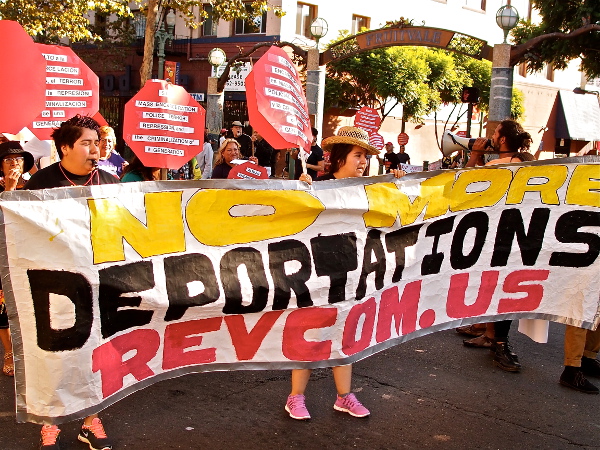
Laura Emiko Soltis. Image: Forbes
Emiko Soltis bio.
Transcription by Rev.com
Emiko Soltis: “Undocumented is racial code. None of these bans would’ve been passed if they said, “Let’s ban brown students.” “
WABE News – Closer Look. February 2, 2016 HERE. Hosts, Jim Burrus and Rose Scott
Speaker 1: Georgia’s University system got what they consider a win from the state Supreme Court, yesterday, when Justice’s decided the Board of Regents can’t be sued by a group of students. That’s because the Supreme Court said, “The Board of Regents is immune from lawsuits.”
Speaker 2: But, the students vow to continue their fight. They’re a group of students who have graduated from Georgia High Schools and had temporary protection from deportation, also known as [DACA 00:00:30] students.
Speaker 1: Now, some of them even say a Regent’s policy that bans them from the state’s top colleges, based on tuition, is racist. Martha Dalton has more.
Martha: This is an audition for the Freedom University Singers. Freedom U is an underground school in Atlanta for undocumented students who want to go to college.
Emiko Soltis: We get our inspiration from the Freedom Schools of The Black Freedom Movement and Freedom Summer, 1964.
Martha: Emiko Soltis runs this school in a secret location. She says, “Like the Freedom Schools of the 60s, Freedom U teaches students how to effectively organize and protest, with lessons in civil disobedience.”
Emiko: And, we provide tuition free, college level classes.
Martha: The school was founded in 2011, after the Board of Regents banned undocumented students from its top 5 universities, even if they graduated from a Georgia High School. Soltis says, “In doing so, the Regents reverted to old southern segregation laws.”
Emiko Soltis: When we look at the exact same Universities that are banning undocumented students, yes, it’s only 5. But, those 5 Universities also banned black students in 1960, and that is absolutely not a coincidence.
Martha: Civil Rights leaders have also chimed in when Universities restrict access for undocumented students. Georgia Congressman John Lewis addressed the issue when he spoke at Emory University’s 2014 graduation ceremony.
John: It doesn’t make sense that we live in a country where more than 12 million people are living in the shadow, living in fear. That is not right. That is not fair and that is not just. And, you must get in the way and find a way to make the way out of no way.
Martha: After his speech, Emory, which is private, changed its tuition policy for undocumented students, so more could attend. Georgia’s public universities aren’t the only ones in the south restricting admissions for undocumented students. South Carolina and Alabama don’t allow undocumented students to attend any state colleges. To Emiko Soltis, that, “[inaudible 00:02:27] of the old south, where discrimination was written into law.”
Emiko Soltis: “Undocumented is racial code. None of these bans would’ve been passed if they said, “Let’s ban brown students.” “
Martha: The University System of Georgia declined to be interviewed for this story, but issued a statement saying it’s following state law, to make sure only those lawfully present get in-state benefits. But, Freedom U student Melissa [Rivas 00:02:48] Triana says she is lawfully present.
Melissa: I was able to apply and get my work permit and then I got a license, so it’s like I have 2 forms of ID now.
Martha: She’s what’s known as a DACA student. She can’t be deported right now, under federal orders, and the interpretation of what it means to be lawfully present is at the heart of the lawsuit the students are waging against the state. Salvador Alvarado doesn’t see the tuition restrictions as racist or a form of segregation. He’s also a Freedom U student and says his main gripe is that the policy that keeps him from getting a college education at a public school in Georgia just makes no sense.
Salvador: You’re limiting he or she to a high school education, where you later on expect that person to get a job and contribute to society, but how is that person able to contribute when he has a low income job or he is limited to what he can do, based on his education?
Martha: Alvarado has a college scholarship, but he might go out of state because top schools like UGA, Georgia Tech, and Georgia State can’t consider him. Students like Alvarado could attend other Georgia public colleges, but they’d have to pay out of state tuition, which is often 3 to 4 times higher, and then there’s Freedom University.
Speaker 8: Yay.
Speaker 9: Good job, yeah.
Martha: Students don’t get college credit for the courses they take, but organizers say, “It opens doors for Georgia’s undocumented students to Universities and scholarships in other states.” Martha Dalton, WABE News.









